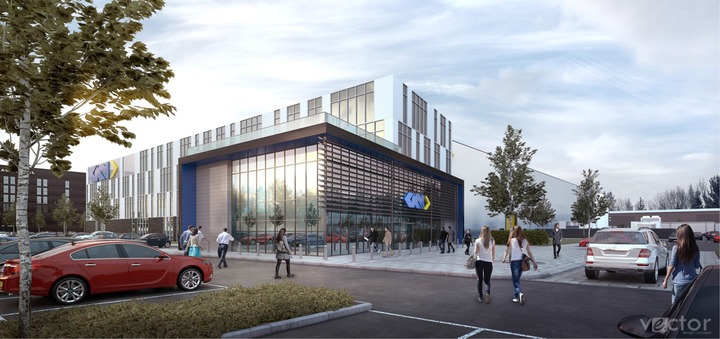University of Sheffield partners with GKN Aerospace to boost new digital technologies in aerospace manufacturing with £32 million centre
06 December 2018- GKN Aerospace's new Global Technology Centre announced today by Greg Clark MP, Secretary of State for Business, Energy and Industrial Strategy.
- £30 million investment from GKN Aerospace and UK Government.
- Centre will act as a hub for world-class innovative technology for the next generation of fuel-efficient aircraft
The University of Sheffield has been announced today (Thursday 6 December 2018) as a partner in GKN Aerospace’s new Global Technology Centre (GTC) aiming to accelerate the adoption of new digital technologies in the aerospace manufacturing, by the Business Secretary Greg Clark.
The new centre - funded by a £17m commitment from GKN Aerospace and a £15m commitment from the UK government, through the Aerospace Technology Institute - is expected to open in 2020 in Bristol.
The 10,000 square metre facility will host 300 highly skilled engineers, and will include collaborative space for research and development with universities, the UK’s CATAPULT network and GKN Aerospace’s UK supply chain.
GKN will work with academics from the University of Sheffield’s Faculty of Engineering and Advanced Manufacturing Research Centre (AMRC) and focus on additive manufacturing (AM), advanced composites, assembly and industry 4.0 processes to enable the high rate production of aircraft structures.
Activities will expand to include collaborative research projects, co-location of staff and students from the Faculty and the AMRC to the GTC, and PhD opportunities to develop the talent pipeline into the aerospace industry.
The University of Sheffield has significant experience in working with manufacturers to become more competitive by introducing new technologies and processes proven by research.
The University of Sheffield’s AMRC has a global reputation for developing the complementary research and innovation capabilities that strengthen the UK’s offer to the high-value manufacturing sector. Its world-class centre helps manufacturers of any size become more competitive by introducing the manufacturing technologies and techniques that help them boost productivity and is the catalyst for performance improvements in the wider UK economy.
The new GTC facility will serve as a base for GKN Aerospace’s technology partnership in the Airbus’ “Wing of Tomorrow” technology programme, as well as new additive manufacturing programmes.
Greg Clark, Secretary of State for Business, Energy and Industrial Strategy said: “GKN Aerospace’s new Global Technology Centre further strengthens our aerospace heritage and engineering expertise, and will keep the UK at the forefront of the latest technologies and manufacturing processes for the next-generation of aircraft.
“As the sector moves towards a cleaner, greener and more efficient future, we are partnering with industry through our modern Industrial Strategy and new Aerospace Sector Deal to ensure we have the skills, innovation and supply-chain to continue our world leadership in aviation.”
Professor Iain Todd, GKN/Royal Academy of Engineering Research Chair in Additive Manufacturing and Advanced Structural Metallics at the University of Sheffield, said: “We look forward to deepening our partnership with GKN Aerospace and helping them develop new digital and additive manufacturing technologies for the aerospace sector.
“This agreement cements our long-term working relationships in this industry and will create many opportunities for students and graduates wanting to gain experience in the aerospace sector, as well as drive research within the Faculty of Engineering.”
Colin Sirett, Chief Executive Officer at the University of Sheffield’s AMRC, said: “We are very pleased to be collaborating with GKN on projects in their new Global Technology Centre.
“The AMRC is looking forward to extending its research work with GKN in the technology areas of Additive, Digital and Machining in the Global Technology Centre. This provides the latest infrastructure element that further strengthens the UK’s position in global aerospace research.”
Professor Mike Hounslow, Vice-President and Head of the Faculty of Engineering, said: “A key strength at the University of Sheffield is our capability to work across all technology readiness levels. The fundamental and experimental research undertaken in the Faculty, combined with the application-driven research at the AMRC is highly effective. This is an attractive proposition for companies such as GKN, as quality, end-to-end research is available from an established and integrated network of experts and facilities.”
Hans Büthker, Chief Executive of GKN Aerospace, said: “GKN Aerospace can trace its engineering heritage back to the 18th century and we are proud of our role as a leading player in the UK’s world leading aerospace sector.
“The GTC will ensure we continue to develop new technologies that deliver for our customers, making aircraft more sustainable and economical. It will also support our 4,000 strong workforce in the UK, ensuring they remain at the cutting edge of the global aerospace industry.
“The GTC is a great example of the UK’s industrial strategy at its best: with industry and the Government coming together to invest in the technology of the future. The GTC will continue to foster such collaboration across the entire UK Aerospace ecosystem and we look forward to working with the British Government in the years to come.’’

